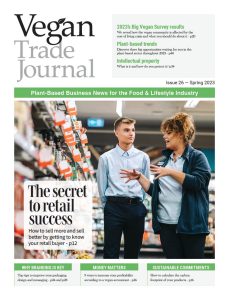How can your business profit from the January health boom? We take a look at how businesses can cash in on this annual diet trend, and how retailers are keeping consumers interested and motivated to sticking to their healthy-eating goals.
The New Year signifies the chance to start afresh, with a clean slate for the year ahead. For many, making a New Year’s resolution is an annual ritual, and some are better at sticking to them than others – old habits die hard, after all. The most common resolutions are typically to lose weight or to revamp a diet, and January is the perfect time to start. Although consumers often tighten their purse strings after an expensive Christmas, they are still keen to try new products that follow January’s diet trends, such as Veganuary.
Be prepared
The best way to increase profitability in the New Year is to be well prepared – have a clear strategy in place ready for the New Year and know what products your target market will be after. Sales figures show that businesses who continued to thrive at the start of the calendar year foresaw consumer behaviour and stocked their products accordingly – one example is Tesco. They launched their Wicked Kitchen range at the beginning of 2018 with the knowledge that consumers would actively be seeking healthy, vegan food. The Wicked Kitchen range has been successful throughout the year, with the range selling four million vegan meals in 33 weeks.
Out of the four largest supermarkets (Tesco, Asda, Sainsbury’s and Morrisons), Tesco remained on the top spot, with sales increasing by 2.6 per cent. Lidl was the fastest growing discounter supermarket with 12 per cent of their sales coming from their own-brand products, appealing to consumers on tighter budgets. Both supermarkets have seen increased market share, with Tesco’s new approach to draw in customers being successful. Mike Watkins, UK head of retailer and business insight at Nielsen, said: “Tesco’s refocus on the customer and their changing needs, such as amplifying ranges and promotions, has meant they’ve not only attracted new shoppers, but encouraged them to visit more often. These incremental improvements are helping reverse the declining spend per visit which was an ongoing challenge for Tesco last year. The growth is also now being supported by initiatives which revisit some wider consumer trends such as tackling food waste and supporting healthier eating and living.”
Knowing that a vast amount of consumers will be looking to eat healthier, preparing products to be launched at this time is a great way to get it recognised. For example, Graze launched a new selection of products at the start of January 2018 to keep up with market trends, all of which targeted consumers who were embarking on a new healthy eating regime. According to The Retail Data Partnership Ltd, “buying in healthier meal deals and ready meals will drive sales and increase your profit margin because healthy products are achieving three times more sales growth than conventional food products are in Western Europe.” They note that healthier meal deals are “a popular choice for consumers trying to shed a few pounds, particularly if they are brands they have purchased before which they know and trust.”
Plant-based boom
Veganism was one of the top trends for 2018, and the movement continues to grow. Ensuring that you have healthy products available for this demographic is vital to generating profit in January. Not only is the population of vegans in the UK increasing exponentially, a plant-based diet is stereotypically linked to be healthier, suggesting more non-vegans could opt for animal-free food products. In 2018, Veganuary reported a 183 per cent increase of participants, with 168,542 people taking part. Of these, 79,000 were omnivores, so securing vegan options for the New Year is key to appealing to all diets and markets. In addition, Dairy Crest has reported that 45 per cent of the UK population buy free-from products more than once a month, and more than 20 per cent of the population are regularly buying dairy-free products.
Target market
The increased sales of organic produce is reportedly down to millennials – a generation known for seeking high-quality, ethically sourced food, in a convenient way. In February 2018, the Soil Association reported that the UK organic market was worth £2.2 billion, which grew by 6 per cent during 2017. Clare McDermott, business development director, Soil Association Certification, said: “One of the biggest stories for organic over the past couple of years has been the rise of online shopping – a trend that shows no sign of slowing down. Driven by convenience, an ever broader range of choice, and by younger generations entering the market, it’s no surprise online sales are outperforming the traditional supermarket on organic.”
Targeting busy consumers with morning ‘grab-and-go’ foods encourages consumers to stick to their New Year’s resolutions with the accessibility of prepared food. The Retail Data Partnership also suggests putting products by the tills to increase impulse buying, while also replacing sweets for healthy alternatives, entices shoppers at the last minute. For example, Tesco have banned sweets from the checkouts, and Lidl and Aldi display various healthy options. As consumers have already committed to following a healthy diet, they’re more likely to be attracted to these foods. It also draws attention to the range of healthy snacks available, and could prompt customers to repurchase these items.
Despite consumers usually tightening their budgets in January, dietary trends and challenges have had their effect on the grocery market – New Year’s resolution or not. Speaking to Talking Retail, Fraser McKevitt, head of retail and consumer insight at Kantar Worldpanel, said: “Trends like Veganuary have taken off and now 29 per cent of evening meals contain no meat or fish at all. This sustained interest in vegan and vegetarian diets is reflected in the chilled aisles
– over January, one in ten shoppers bought a meat-free ready meal. Sales of spinach, cherries and aubergine also grew strongly compared to the past 12 months – up 43 per cent, 25 per cent and 23 per cent respectively.”
Another way to tap into the health boom taking place during January is to get involved with public health campaigns. In January 2018, Tesco announced their support of (nhs.uk/change4life) Change4Life – Public Health England’s campaign to promote healthier snacking for children. Obesity is consistently increasing around the UK, and children’s health is one of the main concerns. Tesco CEO for the UK and ROI, Matt Davies, said: “We know our customers want us to help them eat more healthily – and we know it can be particularly difficult to encourage children to eat healthy snacks. By promoting a wide range of snacks, aligned with Public Health England’s campaign, we hope to make it easier for families to make a healthier start to the year.
This is part of a wider programme to help our customers stay healthy.”
By introducing Healthy Little Swaps at the front of stores, Free Fruit for Kids and Weekly Little Helps, alongside their participation in the Change4Life campaign, customers would have their access to healthy food highlighted, and healthier food becomes easier to incorporate into daily routines over junk food.
The Action Plan
By ensuring products are stocked up to support customers, you will, in turn, sustain yourself financially. Keith Richardson, managing director of retail sector at Lloyds Bank Commercial Banking, said: “The determination to stick to their New Year’s resolutions helped shoppers start 2018 the way they finished last year – by finding ways to keep spending at the checkout. Their baskets may have looked significantly different – with trends like Veganuary and dry January ensuring there was a lot more fresh food and less alcohol than in December. Consumers’ ability to carve out a little extra cash from their discretionary spend to make way for their everyday essentials remains undiminished.” Now is the perfect time for businesses to stock up, and jump on these health trends to maximise profitability, and foreseeing what consumers are going to do will give you an advantage when the New Year rolls around.

